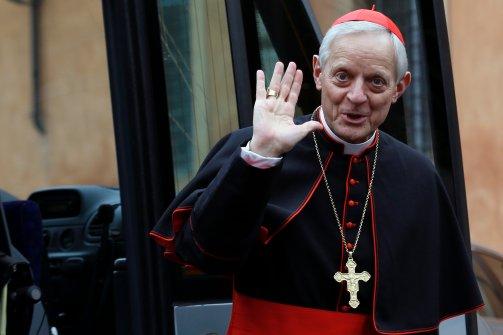Donald Wuerl: America's Candidate for Pope?
By Christopher Dickey
[with video] Archbishop Donald Wuerl fought for justice on behalf of the Church's sex-abuse victims long before the Vatican did. Christopher Dickey on the odds he'll be chosen. Each of the cardinals now in Rome to elect the new pope has long had a church assigned him where he says mass when he’s in the Eternal City. But when Donald Wuerl, Archbishop of Washington, D.C., was made a cardinal in 2010, Pope Benedict XVI gave him a church of singular importance: San Pietro in Vincoli (Saint Peter in Chains). It is a landmark for tourists because Michelangelo’s sculpture of Moses is there, a work of art so full of life and emotion that, so the story goes, when the artist finished he struck it on the knee with a chisel and shouted, “Now speak!” But for Benedict the significance of the church was in its name. As Wuerl told a reporter from his hometown of Pittsburgh, “He [Benedict] reminded me that he had given me this church. He smiled and said, ‘And I have the other one,’ meaning the other one dedicated to Saint Peter.” In the arcane world of Vatican politics, that may have been one factor that led the usually well-informed official Italian news agency, ANSA, to put Wuerl near the top of its list of contenders to replace Benedict when the conclave meets on Tuesday to make its choice. Could it be that by giving him St. Peter in Chains Benedict meant to anoint him? Probably not. The odds favor Italians and Latin Americans. Other Americans -- Sean O'Malley of Boston and Timothy Dolan of New York -- have higher profiles. But as cardinals go, the conclave might do worse than Wuerl. He’s personable, down-to-earth, and regarded by some as one of the leading figures working to rid the Church of its fearsome reputation for covering up sex crimes. On the other hand, he’s also been named one of the “Dirty Dozen” worst candidates by the Survivors’ Network of those Abused by Priests (SNAP). Such are the grim complications and implications for almost any American who would be the de facto king of the world’s 1.2 billion Catholics. The Archbishop of Washington was born in Pittsburgh in 1940, when it was still a steel worker’s city, rough and raw and polluted. His father worked the night shift at a freight yard before joining the Navy in World War II, and his mother died when Donald was only four. But the Church was the road to a wider world. As a young seminarian he studied in Washington, D.C. and at the Pontifical Gregorian University in Rome. Wuerl first came to national attention after Pope John Paul II named him bishop of Pittsburgh in 1988, right in the middle of the first waves of horrific revelations about predatory priests and the shameful way their crimes were covered up by the church hierarchy. His predecessor had just banned three priests in his diocese from public ministry. Another, a former high school principal, was still serving as a diocesan administrator, and after psychiatric treatment Wuerl made him a hospital chaplain. But a few weeks after that decision Wuerl met with the devout, deeply disillusioned, and increasingly litigious family of one victim. They invited Wuerl to dinner and, according to a lengthy and laudatory report in the Pittsburgh Post-Gazette in 2003, when Wuerl left that table his views of the issue had changed. Before, his actions had been closely aligned Church policies, which were basically a CYA masquerading as piety. Now Wuerl told his staff it had to get its priorities straight: the first concern was the injured party, the second was for the person’s family, the third – and only the third – was the potential harm to the church and its reputation. He’s on the record declaring zero tolerance for priests accused of sexual abuse 14 years before that became official policy. But the accusations just kept coming, until it got hard to distinguish between coverups, counter-charges, and good-faith efforts to set the clergy on a more righteous – and legally defensible -- path. In 1993 Wuerl fought to have a priest accused of molesting a young teenager banned from public ministry. But the Vatican reinstated him. Wuerl appealed and fought for two more years before, finally, reluctantly, Rome agreed with the ban. In the years that followed, maybe Wuerl just grew tired. According to SNAP, more than 100 cases might have been brought against the diocese that were nullified by Pennsylvania’s statute of limitations, which make it difficult or impossible for many adults to seek redress for the crimes committed against them as children. In 2010, Wuerl reportedly refused to take action against a priest convicted twice of abusing children, quietly sending him to Maine, where he continued to work without any warning to parishioners or the public. Wuerl’s staff declined to comment on these allegations. Meanwhile the Roman hierarchy has silenced all cardinals, especially the Americans who were giving daily briefings to the press and might have been in a position to defend themselves if they chose. Leaks to Italian reporters by what are presumed to be Italian clergy continue. So, deeply imbued with the spirit of hypocrisy, the process of choosing the new pope continues. Before the gag order, Wuerl told the Pittsburgh Post-Gazette, “The first and driving issue is the ability of the church to bring the Gospel once again to those who think they know what the Gospel says and for whom they believe it has no meaning.” One is tempted to say “amen to that.” But what’s desperately needed after all this sleaze is to clear the air of sophistry. What you really want to say to Wuerl there in San Pietro in Vincoli is: “Now speak!”
|
.
Any original material on these pages is copyright © BishopAccountability.org 2004. Reproduce freely with attribution.
